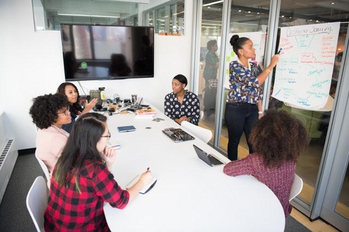 It goes without saying that good teachers are good communicators—or does it? (Tweet it!) Many universities and business schools rely on “expert” teachers who are tops in their field, but not necessarily skilled at transferring their knowledge to other people. Writing in The New York Times , organizational psychologist Adam Grant points out that experts in any given field might have mastered basic material so long ago that they are especially challenged in conveying it to novices. In addition, the skills that got them where they are—e.g. research brilliance or entrepreneurial success—may not have prepared them to teach what they know to others. “I’ve come to believe that if you want to learn something new, there are three factors that you should keep in mind when choosing a teacher — whether it’s a professor or mentor or soccer coach,” writes Grant. To quote…
Tell us about the best teacher you ever had. How did this person communicate material in a way that resonated with you? Have you ever had an “expert” teacher who was hard to understand and learn from? If you are a teacher, what are your communication best practices? To join the conversation, click "comments" above. If you would like to learn more about creating a habit around masterful communication, check out our online learning series.
2 Comments
 Many people want to be able to converse well at parties, networking events, and interviews. In a recent New York Times “Smarter Living” column (https://nyti.ms/2xmb9mj), Tim Herrera compiled the following tips:
Finally, we’d like to add a guideline that Justin Jones- Fosu recommends. Before you start talking about yourself, ask your conversation partner three follow up questions. Chances are they’ll think you’re the smartest person in the room! Do you consider yourself a good conversationalist? What are your secrets? (Tweet it!) To join the conversation, click "comments" above. If you would like to read more about creating a habit around masterful communication, check out our book: Be Quiet, Be Heard: The Paradox of Persuasion  Is your workplace tainted with a negative vibe: complaints, gossip, co-workers undercutting one another? Combating negativity can begin with one person: Might that be you? (Tweet it!) Writing in Forbes , Millennial and Gen Z engagement expert and speaker Ashira Prossack offers these tips for anyone willing to try to reverse the tone of their work environment:
Have you experienced negativity in your workplace? Have you done anything to reduce it? Is it working? We’d love an example! To join the conversation, click "comments" above. If you would like to read more about creating a habit around masterful communication, check out our book: Be Quiet, Be Heard: The Paradox of Persuasion  Most people have yelled at their kids—and doing so to keep them from running into traffic is perfectly understandable. (Tweet it!) But it’s ineffective if you’re doing it to correct a behavior like throwing clothes on the floor or procrastinating on homework. In fact, it “merely imprints the habit of yelling onto the children.” So says Stephen Marche, author and parenting podcaster. Writing in The New York Times, Marche cites a 2014 study in The Journal of Child Development, which demonstrates that yelling produces results similar to physical punishment in children: increased levels of anxiety, stress and depression along with an increase in behavioral problems. Since “yelling…is the response of a person who doesn’t know what else to do,” Marche recommends an alternative: the ABC technique of Alan Kazdin, professor of psychology and child psychiatry at Yale.
The purpose of Kazdin’s ABC’s is to build habits by actually changing the brain. And, as a positive side effect, family relations improve overall. Have you ever been brought to yelling at your kids? How could you use the ABC’s instead? To join the conversation, click "comments" above. If you would like to read more about creating a habit around masterful communication, check out our book: Be Quiet, Be Heard: The Paradox of Persuasion  Work can be stressful, but sometimes we overreact to even a mild correction or critique with excessive defensiveness, even outrage. (Tweet it!) Why? Our brain wiring may be part of the answer. The human brain is wired for pattern recognition, and we interpret the present in terms of past experience. If the person criticizing us reminds us of someone from our past with whom we had a difficult relationship, we can reach into our “relationship data bank” and dredge up what Sigmund Freud called a transference – meaning we actually transpose our feeling about one person onto another. Writing in the Harvard Business Review, executive coaches Manfred F.R. Kets de Vries and Katharina Balacz, advise that anyone who notices they may be overly sensitive at work should ask themselves these questions:
While our unconscious transference reactions can cause overreactions, becoming aware of them can help us modulate our responses, avoid repeating mistakes and be more in control of outcomes. Have you ever overreacted at work, perhaps multiple times with the same person? Do you think there is a chance this person reminds you of someone with whom you had a complex and difficult relationship in the past? To join the conversation, click "comments" above. If you would like to read more about creating a habit around masterful communication, check out our book: Be Quiet, Be Heard: The Paradox of Persuasion |
Archives
July 2024
Categories
All
|
|
Glaser & Associates, Inc.
Executive Offices 1740 Craigmont Avenue, Eugene, OR 97405 541-343-7575 | 800-980-0321 [email protected] |
© 2019 Glaser & Associates. All Rights Reserved.


 RSS Feed
RSS Feed